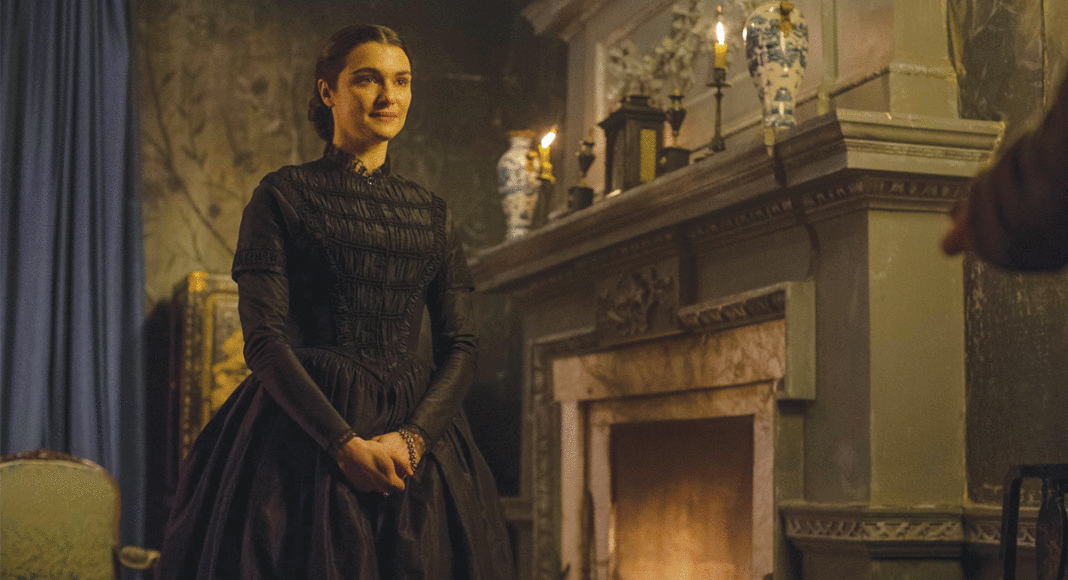It’s all about the brooding atmosphere in My Cousin Rachel. Written and directed by Roger Michell, it’s a handsomely produced, meticulously crafted adaptation of the classic Daphne Du Maurier novel, a tale of psychological intensity wrapped in the trappings of 19th century Gothic melodrama. Mystery, revenge, and romantic obsession all play a part in a plot that seems to shift gears as often as the whims of its impressionable young protagonist.
But like the best Du Maurier stories—and the best movies made from them—it resists attempts to slot it into any one genre. For all the shadowy interiors glimpsed by flickering candlelight, and the vast, sweeping aerial views of the spectacular windswept seacoast of Cornwall, My Cousin Rachel has more going on below the surface than the typical Gothic romance. And if the mystery at the center of the story is less cleanly resolved than some viewers might like, the fact that you keep questioning the story and harrying it from different viewpoints long after the lights come up adds an extra dimension of interactive intrigue.
Set in the Victorian era, it’s the story of Philip, a little boy who loses his parents, and is taken in by his older cousin, Ambrose. Philip grows up at his bachelor cousin’s country estate in Cornwall, where he and Ambrose work alongside the (mostly male) dependents who keep the sheep ranch running. Even the house servants are men. “The only females allowed in the house were the dogs,” says Philip.
Soon after Philip comes home from boarding school as a young man (now played by Sam Claflin), Ambrose is ordered to go to Italy for his health. His letters home begin to revolve around an intriguing half-Italian Englishwoman, Rachel, with whom he is smitten, and whom he soon marries. But Philip is unclear on the concept of marriage, given his upbringing. Asked if he never wondered if his cousin might “need a woman,” Philip says, “Why? He had me.”
But Ambrose dies suddenly, and Philip is eager to blame the mysterious, unknown Rachel—especially when his cousin’s last letter is more like a cry for help. When he gets word that Rachel is coming to visit the estate, Philip determines to confront her with his suspicions and see her punished. But the cold reception he plans for her heats up when he gets his first look at Rachel herself (the ever-beauteous Rachel Weisz), and finds himself charmed by her warmth, humor, and sense of honor.
From this point on, the plot unfolds at a brisk pace that keeps the audience guessing. Loyalties shift, assumptions are questioned, schemes are hatched, and expectations are confounded or confirmed—and then confounded again. It all plays out within a series of familiar, yet lusciously rendered Gothic tropes: altered wills, cryptic notes, mysteriously brewed potions. All of which are meant to help us chisel away at the central question: is Rachel an opportunistic black widow, capable of murder? Or is she merely the object of the overheated fancies of an inexperienced youth in the throes of his first infatuation?
But this is hardly a conventional whodunit—or even a question of whether an “it” was done at all. It’s more compelling as a character study of two alien life forms on a collision course. Weisz’ socially poised and worldly Rachel bristles that Philip thinks he can control her with love or things, yet can be so meltingly vulnerable, any interpretation might fit her. Claflin, fresh from his terrific turn as the acerbic, wisecracking scriptwriter in Their Finest, plays in the opposite key here, a youth whose towering, if instantaneous passions are matched only by his aching gaucheness. (In a sly casting decision, Claflin also plays an equally unsophisticated Ambrose in the prologue.)
Veteran filmmaker Michell has made a career out of small movies with an independent feel (including my favorite Jane Austen adaptation, Persuasion, in 1995). My Cousin Rachel is a bracing homage to the Du Maurier spirit that invites us to ponder, but never tells us exactly what to think.
MY COUSIN RACHEL
*** (out of four)
With Rachel Weisz, Sam Claflin, Holliday Grainger, and Iain Glen
Written and directed by Roger Michell. From the novel by Daphne Du Maurier. A Fox Searchlight release. Rated PG-13. 106 minutes.















Set WHERE, please? Don’t assume we can guess from the accents that aren’t portrayed above.